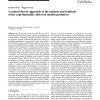64 search results - page 4 / 13 » How the growth of science ends theory change |
BC
2005
15 years 26 days ago
2005
Recent experiments on frogs and rats, have led to the hypothesis that sensory-motor systems are organized into a finite number of linearly combinable modules; each module generates...
85
Voted
CSCW
2004
ACM
15 years 6 months ago
2004
ACM
Under-contribution is a problem for many online communities. Social psychology theories of social loafing and goal-setting can provide mid-level design principles to address this ...
HICSS
2003
IEEE
15 years 6 months ago
2003
IEEE
This paper provides descriptive research about a successful collaborative vision development process undertaken for a regional United Way. The entire process from learning about t...
NN
1998
Springer
15 years 19 days ago
1998
Springer
We experimented on task-level robot learning based on bi-directional theory. The via-point representation was used for ‘learning by watching’. In our previous work, we had a r...
116
click to vote
HICSS
2005
IEEE
15 years 6 months ago
2005
IEEE
E-learning growth is driven by global, societal, and technological changes that both enable and require increased worker and learner mobility, access to distributed domain experti...

